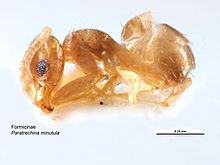| Paraparatrechina | |
|---|---|

| |
| Paraparatrechina minutula | |
| Scientific classification | |
| Domain: | Eukaryota |
| Kingdom: | Animalia |
| Phylum: | Arthropoda |
| Class: | Insecta |
| Order: | Hymenoptera |
| Family: | Formicidae |
| Subfamily: | Formicinae |
| Tribe: | Lasiini |
| Genus: | Paraparatrechina Donisthorpe, 1947 |
| Type species | |
| Paratrechina pallida Donisthorpe, 1947 | |
| Species | |
Paraparatrechina is a genus of small ants in the subfamily Formicinae. The genus contains 39 species distributed in the tropics of Africa, Asia and Australia.
Distribution and habitat
The genus is restricted to the Paleotropics. Thirteen species are known from the Afrotropical and Malagasy regions, and twenty-five species and subspecies from Asia and Australia, although preliminary study suggests that there are many undescribed species. Very little is known about the biology of Paraparatrechina in the Afrotropical and Malagasy regions. They have been found in a wide range of tropical habitats from rainforests to forest clearings in sifted leaf litter, rotten logs, under stones, and from beating vegetation and fogging samples from the forest canopy.
Taxonomy
Paraparatrechina was first described as a subgenus of Paratrechina by Donisthorpe (1947). LaPolla et al. (2010a) elevated the formerly synonymized subgenus to genus rank based on both morphological and molecular data.
Description
Paraparatrechina are small (typically around 1–2 mm (0.039–0.079 in) in total length) formicine ants, which often reflect a metallic iridescence (blue, purple and pink hues have been observed) under light microscopy. In darker species, the iridescence tends to be a darker bluish-purple, while lighter colored species either show little iridescence or reflect a more pinkish-purple hue. Paraparatrechina are usually easily distinguishable from other formicine genera by a unique mesosomal setal pattern: two pairs of erect setae on the pronotum, one pair on the mesonotum and one pair on the propodeum. Nylanderia, the genus most likely confused with Paraparatrechina, never possesses a pair of erect setae on the propodeum. The mandibles of Paraparatrechina also possess five teeth, while in Nylanderia six teeth are usually present.
Species
- Paraparatrechina albipes (Emery, 1899)
- Paraparatrechina brunnella LaPolla, Cheng & Fisher, 2010
- Paraparatrechina bufona (Wheeler, 1922)
- Paraparatrechina butteli (Forel, 1913)
- Paraparatrechina caledonica (Forel, 1902)
- Paraparatrechina concinnata LaPolla, Cheng & Fisher, 2010
- Paraparatrechina dichroa (Karavaiev, 1933)
- Paraparatrechina emarginata (Forel, 1913)
- Paraparatrechina foreli (Emery, 1914)
- Paraparatrechina glabra (Forel, 1891)
- Paraparatrechina gnoma LaPolla, Cheng & Fisher, 2010
- Paraparatrechina iridescens (Donisthorpe, 1942)
- Paraparatrechina kongming (Terayama, 2009)
- Paraparatrechina koningsbergeri (Karavaiev, 1933)
- Paraparatrechina lecamopteridis (Donisthorpe, 1941)
- Paraparatrechina minutula (Forel, 1901)
- Paraparatrechina myops LaPolla, Cheng & Fisher, 2010
- Paraparatrechina nana (Santschi, 1928)
- Paraparatrechina neela Sahanashree, Punnath & Rajan Priyadarsanan, 2024
- Paraparatrechina nettae (Forel, 1911)
- Paraparatrechina oceanica (Mann, 1921)
- Paraparatrechina ocellatula LaPolla, Cheng & Fisher, 2010
- Paraparatrechina opaca (Emery, 1887)
- Paraparatrechina oreias LaPolla, Cheng & Fisher, 2010
- Paraparatrechina pallida (Donisthorpe, 1947)
- Paraparatrechina pusillima (Emery, 1922)
- Paraparatrechina sauteri (Forel, 1913)
- Paraparatrechina splendida LaPolla, Cheng & Fisher, 2010
- Paraparatrechina subtilis (Santschi, 1920)
- Paraparatrechina tapinomoides (Forel, 1905)
- Paraparatrechina umbranatis LaPolla, Cheng & Fisher, 2010
- Paraparatrechina weissi (Santschi, 1910)
References
- ^ Bolton, B. (2014). "Paraparatrechina". AntCat. Retrieved 5 July 2014.
- "Genus: Paraparatrechina". antweb.org. AntWeb. Retrieved 23 September 2013.
- ^ LaPolla, John S.; Cheng, Chiu H.; Fisher, Brian L. (2010b). "Taxonomic revision of the ant (Hymenoptera: Formicidae) genus Paraparatrechina in the Afrotropical and Malagasy Regions". Zootaxa. 2387: 1–27. doi:10.11646/zootaxa.2387.1.1.
- Donisthorpe, H. (1947). "Some new ants from New Guinea". Annals and Magazine of Natural History. 14 (11): 183–197. doi:10.1080/00222934708654624.
- LaPolla, J.S.; Brady, S.G.; Shattuck, S.O. (2010a). "Phylogeny and taxonomy of the Prenolepis genus-group of ants (Hymenoptera: Formicidae)". Systematic Entomology. 35: 118–131. Bibcode:2010SysEn..35..118L. doi:10.1111/j.1365-3113.2009.00492.x. S2CID 86659687.
- [REDACTED] This article incorporates text from a scholarly publication published under a copyright license that allows anyone to reuse, revise, remix and redistribute the materials in any form for any purpose: LaPolla, John S.; Cheng, Chiu H .; Fisher, Brian L. (2010). "Taxonomic revision of the ant (Hymenoptera: Formicidae) genus Paraparatrechina in the Afrotropical and Malagasy Regions". Zootaxa. 2387: 1–27. doi:10.11646/zootaxa.2387.1.1. Please check the source for the exact licensing terms.
External links
- [REDACTED] Media related to Paraparatrechina at Wikimedia Commons
| Taxon identifiers | |
|---|---|
| Paraparatrechina | |